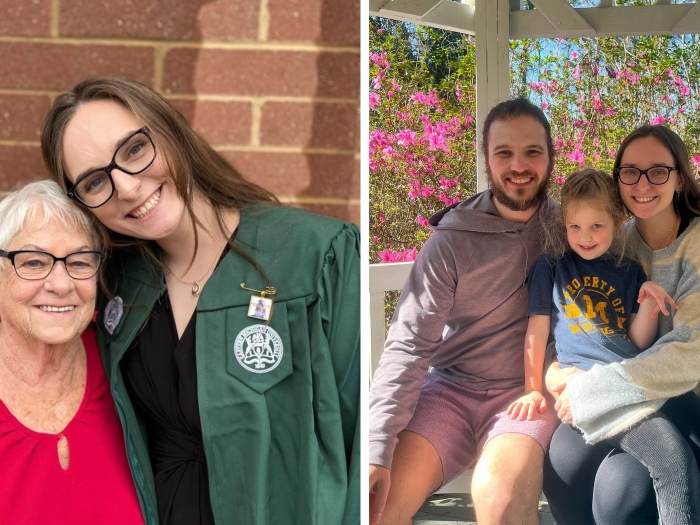Two studies highlight the important role of PCPs and their communication with patients at various stages of their cancer journeys.
8:00 AM
Author |

Communication between patients and their primary care providers is key to ensuring effective cancer care, both before diagnosis and after treatment, according to two recent papers led by University of Michigan Rogel Cancer Center researchers.
Although each study analyzed different stages of care, both showed that involving patients in their own care through a personalized approach that capitalized on their relationship with their primary care provider made patients more likely to follow through on important health visits, such as cancer screenings or follow-up appointments once their cancer treatment was finished.
The newer of the two studies, published in eLife, used detailed surveys to analyze cervical and colorectal cancer screening rates among women in southeast Michigan between 50 and 65, the age range that is least likely to get screened.
Women who said their primary care provider, or PCP, involved them in their decisions about their health care as much as they, the patients, wanted were more likely to have undergone both cervical and colorectal cancer screenings compared to respondents who weren't up-to-date on either screening.
SEE ALSO: Primary Care Doctors Play Key Role at Life's End, Research Finds
The same held true when comparing women who'd had dual screenings within the recommended windows and those who had had only a single screening in accordance with the United States Preventive Services Task Force's guidelines.
"We showed for the first time that the relationship between the PCP and the woman was the important distinguishing factor in dual cancer screening," said Diane M. Harper, M.D., M.P.H., a primary care physician at Michigan Medicine and a professor in the departments of Family Medicine and Obstetrics & Gynecology at the University of Michigan Medical School. "This creates a hypothesis that comprehensive cancer screening may best be accomplished through a PCP-patient relationship and not through targeted single cancer site screenings." (Harper is also eLife's co-deputy editor for medicine but was not involved in the review process for this paper.)
In the U.S., specialists tend to dictate recommendations around cancer screenings as well as provide the majority of the tests, with gynecologists taking the lead for cervical cancer and gastroenterologists dominating colorectal cancer screenings.
The other U-M study, a pilot clinical trial, also explored the roles of different types of health care providers in cancer care. Its focus was on survivorship — when a patient has finished cancer treatment but still requires follow-up care — and how best to communicate with patients during that time, when primary care providers begin to play more of a role in patients' care.
The researchers designed a website and an appointment reminder system that were individually tailored to women who were nearing the end of their treatment for early-stage breast cancer and about to transition into the survivorship phase.
The website, called ConnectedCancerCare, featured educational content about:
-
What type of care was necessary during the survivorship period based off their diagnosis and history;
-
How all the patients' providers, including both oncologists and PCPs, would be involved in their care going forward into survivorship;
-
The importance of scheduling follow-up visits with their PCPs;
-
Tips and suggestions for how to communicate with their providers in order to get the most out of their doctor's appointments.
Oncology and primary care providers also received information about patient preferences, concerns and knowledge gaps, so they could better anticipate the patients' questions and communicate with them when they came in for a visit.
Ultimately, a higher proportion of the women who had been randomly selected to receive information through ConnectedCancerCare reported the program improved their understanding of the way their care would work and that it helped them feel more confident in their PCPs' ability to handle their care during survivorship compared to those in the control group. (This latter group of women received generic information outlining expectations for survivorship after breast cancer.)
Those who had access to ConnectedCancerCare were also more likely to schedule follow-up visits with their PCPs.
"Our findings suggest that deploying ConnectedCancerCare in a medical oncology practice is not only feasible, but the content is also acceptable among women with breast cancer," said Lauren P. Wallner, Ph.D., M.P.H, an associate professor in the division of general medicine at the University of Michigan Medical School and the Department of Epidemiology at the University of Michigan School of Public Health. "It also shows promise for improving patient knowledge and patient-provider communication about provider roles in team-based cancer care and patients following up with their PCP early in the survivorship period."
SEE ALSO: Primary Care at a Crossroads: Experts Call for Change
Additional authors of the cancer screening study include Madiha Tariq, M.P.H., Asraa Alhawli and Nadia Syed, M.P.H., all of the Arab Community Center for Economic and Social Services, and Minal R. Patel, Ph.D., M.P.H., and Ken Resnicow, Ph.D., of U-M.
Additional authors of the CCC study include Joan G. Gargaro of the Ann Arbor VA Center for Clinical Management Research; Paul Abrahamse, Archana Radhakrishnan, M.D., M.H.S., Megan A. Mullins, Ph.D., M.P.H., Lawrence C. An, M.D., Jennifer J. Griggs, M.D., M.P.H., Anne F. Schott, M.D., John Z. Ayanian, M.D., M.P.P., Anne E. Sales, R.N., Ph.D., Steven Katz, M.D., all of U-M, and Sarah T. Hawley, Ph.D., M.P.H., of U-M and the Ann Arbor VA.
Papers cited:
"Cancer risk perception and physician communication behaviors on cervical cancer and colorectal cancer screening," eLife. DOI: 10.7554/eLife.70003
"Improving the delivery of team-based survivorship care after primary breast cancer treatment through a multi-level intervention: a pilot randomized controlled trial," Breast Cancer Research and Treatment. DOI: 10.1007/s10549-021-06257-w

Explore a variety of healthcare news & stories by visiting the Health Lab home page for more articles.

Department of Communication at Michigan Medicine
Want top health & research news weekly? Sign up for Health Lab’s newsletters today!





